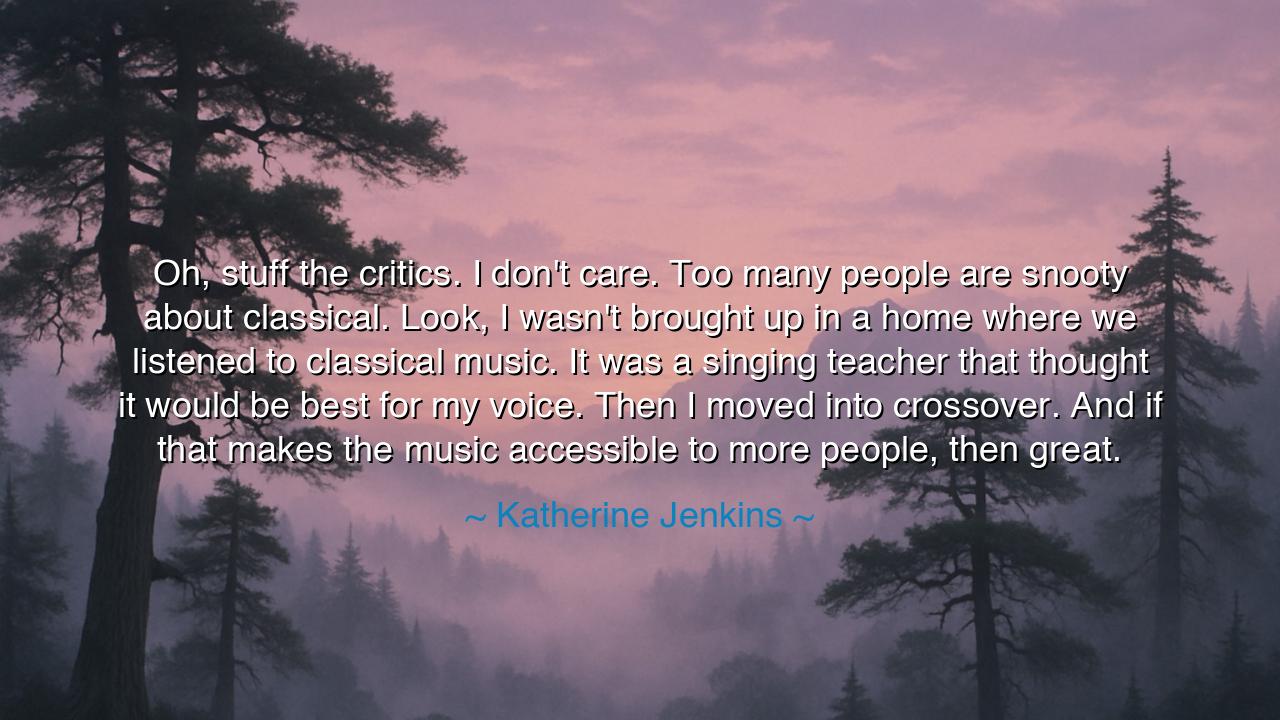
Oh, stuff the critics. I don't care. Too many people are snooty
Oh, stuff the critics. I don't care. Too many people are snooty about classical. Look, I wasn't brought up in a home where we listened to classical music. It was a singing teacher that thought it would be best for my voice. Then I moved into crossover. And if that makes the music accessible to more people, then great.






Katherine Jenkins once spoke with the fire of defiance and the gentleness of truth: “Oh, stuff the critics. I don’t care. Too many people are snooty about classical. Look, I wasn’t brought up in a home where we listened to classical music. It was a singing teacher that thought it would be best for my voice. Then I moved into crossover. And if that makes the music accessible to more people, then great.” These words, though born from the modern stage, carry the spirit of the ancients: that the purpose of art is not pride, but connection; not exclusion, but communion.
The heart of her words lies in rebellion against critics who guard the gates of culture too tightly. They would bind classical music in chains, declaring it a treasure only for the learned, the wealthy, or the refined. But Jenkins reminds us that art is not meant to be a relic sealed in glass. Its true power is revealed when it breathes among the people, when the great hymns of the soul are sung not in lofty halls alone, but in the hearts of all. To dismiss accessibility as weakness is to forget that even the greatest composers drew upon the songs of the common folk, weaving their voices into symphonies for eternity.
The story of Jenkins herself is a testament to this truth. She did not grow up amidst grand pianos or opera houses, but in a simple home, guided by a singing teacher who saw the path her voice might take. She moved boldly into crossover, fusing classical purity with popular spirit, not to dilute the music, but to invite more people into its beauty. In this, she echoes the great teachers of history who sought not to keep wisdom for a few, but to share it widely. Socrates walked the streets, speaking to shoemakers and merchants; Jesus spoke in parables so that fishermen and farmers could understand. True greatness is not aloof; it bends down so that all may rise with it.
History too offers examples of such defiance. When Beethoven, deaf and broken in body, composed his Ninth Symphony, he dared to set Schiller’s “Ode to Joy” at its heart — a hymn to brotherhood, meant not for kings but for all humanity. Critics scoffed, but time revealed the truth: Beethoven had given the world a song that transcended boundaries, a music that united. Katherine Jenkins stands in this same lineage, insisting that the nobility of classical can live alongside the accessibility of popular sound, and in that union, touch more souls.
The meaning is clear: art is not diminished when it is shared. It is diminished when it is hoarded. The critic who demands purity above all forgets that music itself was born from the cries of the earth, from shepherds’ pipes, from lullabies of mothers, from the chants of villages under the open sky. To make it the possession of a few is to betray its origin. To open it through crossover is to return it to its rightful place: the common heart of humanity.
The lesson, therefore, is not only for singers but for us all. Whatever gift you have — be it knowledge, skill, or creation — do not hold it back for fear of the critics. Share it widely, even if some sneer, even if others call it unworthy. For the true measure of worth is not the praise of the elite, but the lives touched, the hearts lifted, the minds awakened. Better to bring beauty to the many than to keep it locked for the few.
Practically, this means we must dare to step beyond fear of judgment. Sing if you have a song, write if you have words, build if you have vision — and let not the critics still your hand. And in your listening, be humble: welcome both the grandeur of the symphony and the simplicity of the folk tune, for each carries a spark of the eternal. In this way, you will walk the path Jenkins declares, where accessibility is not dilution, but expansion, and where the true purpose of art is fulfilled.
Thus, remember her cry: “Oh, stuff the critics.” For art belongs to the people, and music is not for the few, but for the many. If your gifts bring joy, healing, or hope to others, then you have already triumphed over the voices of pride. Walk boldly, create fearlessly, and let your life itself become a song that is accessible to all.






AAdministratorAdministrator
Welcome, honored guests. Please leave a comment, we will respond soon